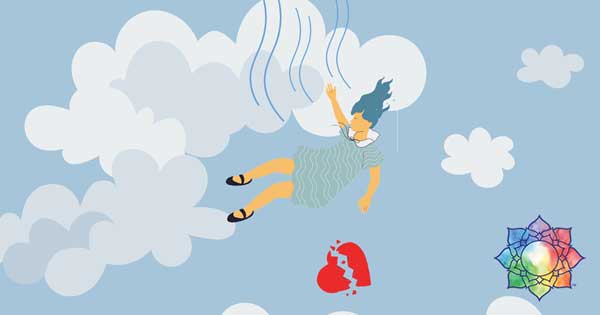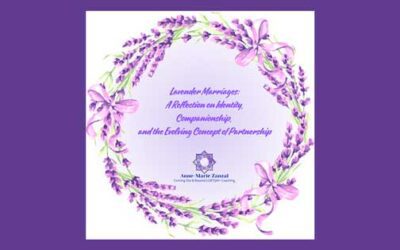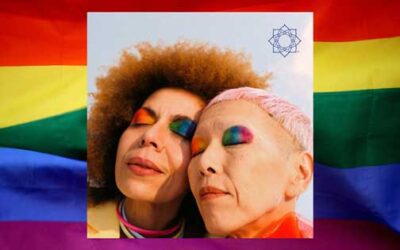Catalyst relationships have a way of turning our lives upside down. In the LGBTQIA+ community a catalyst is a person who helps us realize that we might not be as straight as we thought we were. A catalyst can also be a life changing event, but let’s save that for another blog piece.
Does this scenario sound familiar? You’ve just been minding your own business, perhaps settled into a routine of married life and raising kids, and BOOM! – in walks your catalyst.
The Magical Moment a Catalyst Changes Everything
Maybe it hits you like a ton of bricks, or maybe it creeps up on you gradually, but at some point you can’t shake the attraction you feel for her. When you find out your catalyst has feelings for you too, it’s like a switch flips inside of you. You MUST explore these feelings. And, chances are, what she makes you feel is different than anything you’ve ever experienced before. You connect with a side of yourself you didn’t know existed, and you learn that loving another woman isn’t just possible – it’s magical. The connection, the intimacy, the bonding, the outpouring of love, the pleasure, it’s all you’ve ever wanted and more.
In light of this new discovery, you make some hard decisions about your life and circumstances. You decide that moving forward in your straight life is untenable. You pursue a relationship with your catalyst because it represents all of the love and fulfillment you could have ever wanted. There is a period of turbulence as you disassociate from your straight life and step into your Queer identity. You may not know where in the LGBTQIA+ spectrum you fit, but it doesn’t matter, because it’s really just about being with your catalyst.
Then, another shift comes. Weeks or months go by and the dynamic between you and your catalyst changes.
Reality Hits After the New Relationship Excitement Fades
Now that you’ve stepped away from your straight life and committed to a relationship with her, the reality of a partnership with your catalyst comes into full view. It isn’t just about the happy, lovey, sexy parts of your relationship anymore. Reality sets in, and to your shock and dismay, you begin to realize that your relationship with your catalyst has taken a turn for the worse.
You discover that you’re not quite as compatible on a day-to-day basis as you thought you were. She doesn’t understand you – particularly the grief you’re experiencing about letting go of your old life – and you often don’t understand her. You struggle as a couple. You communicate poorly. You fight. And one day, it’s over. The person you thought was the love of your life – who opened you up to a side of yourself that you didn’t know existed – makes her exit. And you’re left standing there wondering how it could have all gone so wrong.
It’s Normal to Feel Heartbroken & Experience Grief After a Catalyst Relationship Ends
Just as the love you felt with her was unlike anything you’ve ever felt before, the grief you feel when it’s over is more painful than anything you’ve ever experienced. Your heart isn’t broken, it is shattered. And somehow, you have to find a way to go forward. There’s no going back to your old life. There’s no going forward with her. So…what now?
My friends, if you see yourself in what I’ve described above, let me extend a big, virtual hug, because I know what you’re feeling right now. You’re devastated. You’re hurt, right to your core. You’re walking through life with a heavy backpack full of grief, wondering how you’ll ever have the strength to go on. I know this because it was my story too. I had a catalyst, and it was the best and worst experience of my entire life.
What is Disenfranchised Grief?
One of the crummiest parts about ending a relationship with your catalyst is feeling terribly alone. This is called disenfranchised grief and If you’re like me, there was no one in my sphere of family and friends who could relate to what I was going through.
My loved ones knew I was grieving, but few stepped into my grief to hold me in my feelings. Many just didn’t understand. Some thought I brought this mess upon myself. Others were angry and confused over the changes in my life.
I had people who loved me, but none who could integrally understand the pain I experienced when my catalyst relationship ended. There is a name for this kind of suffering, and it is Disenfranchised Grief. This means you’re experiencing a loss that others simply do not understand.
There Are Many Who Understand What You Are Going Through — Even if You Don’t Know It
The grief you may experience at the end of a catalyst relationship can have you feeling utterly alone, but trust me when I say you are far from alone in this experience! There are THOUSANDS of us who have survived a catalyst relationship. Catalyst experiences are not rare, they are incredibly common. But finding friends, family or even a therapist who has experience and/or knowledge of catalyst relationships can be difficult. What’s more, if you’re grieving the loss of your catalyst, you might not feel safe to talk about your feelings with others for fear of being judged or misunderstood.
Life Can Seem Unbearable, and With Time it Gets Easier
I remember those early days after my catalyst relationship ended. It was unbearable. I had lost everything – my marriage, my home, time with my kids, my job, I became ill…and can I tell you something super personal and super real?
I thought about ending it all. It’s hard to admit, but I felt like my life burnt to the ground and I was the one who lit the match. I felt deep grief and shame when my catalyst relationship ended and I wondered what the point was of going on? I often found myself daydreaming about jumping off the roof of the building I was living in and ending my pain. That’s about as raw and real as it gets.
So the good news is I didn’t jump off the roof. I’m still here, and living my best, gay life in full technicolor. I recovered from the trauma of my catalyst experience, but it wasn’t quick or easy. Gradually, I took steps to rebuild my life and build my sense of self worth. I leaned into the people who loved me. I took time to figure out if I was really gay, or just gay for my catalyst (spoiler: I’m SUCH a lesbian!).
After the Heartbreak Comes Freedom to Explore and Discover
I figured out who I am as an individual, not who I am in the context of a couple. I developed my own identity – something (as a person who married young) I never really had the chance to do. I went on to have more romantic relationships with women and learned from each experience what I did and did not want in a partnership. And, eventually, I met a woman who added to my happiness, who I am truly compatible with, and – surprise ending! – we’re getting married next year. When I think of how far I’ve come in the past 6 years, it is truly astonishing.
You Are Not Alone, We Are Here to Support You on Your Journey
If you’ve had a catalyst relationship and are feeling lost and alone, take heart. You are not alone. And if you need a lesbian-big-sister to coach you through to the other side, to a place where you can feel happy again, give me a call. Just speaking your story aloud to another person who understands can help to lift your grief.
Are you looking for a LesbIan Big Sister to help you recover from this relationship? That’s me! {Book a free Discovery Call with me here >
Looking for more about understanding catalyst relationships? One of our other blogs features an interview with Miriam Grace, a psychotherapist who does a great job of explaining the catalyst phenomenon.
You can also listen to Anne-Marie’s podcast interview with Miriam Grace here >








